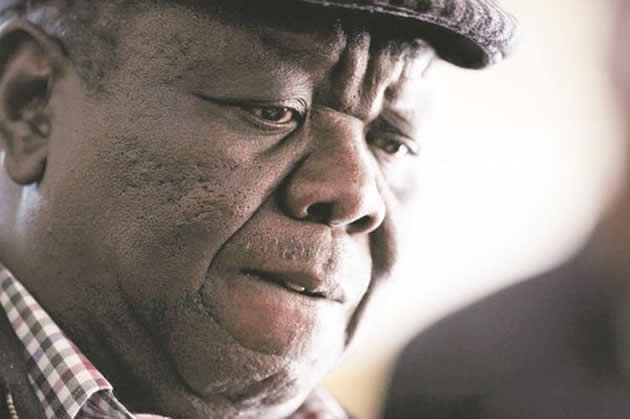Of desperate Tsvangirai, SA’s Damascene moment

Hildegarde The Arena
MDC-T leader Mr Morgan Tsvangirai never ceases to amaze me. The man is desperate to lead Zimbabwe. As Veronica Roth points out, it is desperation that can “make a person do surprising things.”
Desperation is written all over him, and you wonder why the trajectory is even rising. 2018 is not far off, so if he wants to have another go at the presidency, it is about time he reflected on why and how he has failed to clinch it since 2002.
Despite threatening that his party will not participate in any election until electoral reforms are implemented, he has been on the campaign trail in the past weeks. Some of the stuff that he says at those rallies is testimony to that desperation.
People argue that this is because he has nothing else to do. When his colleagues in the MDC formation got farms under the land reform programme, he spurned it because his Western backers would have abandoned him.
This is why Tsvangirai had no qualms attacking one of Africa’s founding fathers Dr Kwame Nkrumah who spearheaded the formation of the Organisation of African Unity, now African Union, and an organisation that fought for the liberation of the rest of the African continent.
The free Zimbabwe that Tsvangirai so desperately wants to rule became independent because of the foundation and building blocks laid by the likes of Ghana’s founding president Dr Nkrumah. However, on the 52nd anniversary of Africa Day on Monday, Tsvangirai did not have kind words for Nkrumah.
Addressing a rally in Kuwadzana, Harare, he was quoted as having questioned Dr Nkrumah’s vision for Africa: “Seek ye first political kingdom and all else shall be added unto you,” a call that reminisces what the Lord Jesus says in Matthew’s gospel chapter 6:33 — “But seek ye first the kingdom of God, and His righteousness; and all these things shall be added unto you.”
Tsvangirai asked: “Is that true? Is that prophetic? Was Nkrumah right or was he wrong? He was very wrong; because akaseta vision yakaipa (he set a wrong vision). How can you say we should just have political freedom? Munhu haadyi flag, haadyi national anthem. (You don’t eat a national flag, and neither do you live on the national anthem).
Obviously Dr Nkrumah was inspired by the Lord Jesus’ teachings, and to further amplify how he thought that this would help the people of Africa, I make reference to the word of God again.
Paul, writing to the Romans says: “Consequently, faith comes from hearing the message, and the message is heard through the word of Christ.” (Romans 10:17) I take it that Nkrumah was making a declaration about the realities he had seen happening in countries that had fought for their independence, for example the United States of America where he studied.
They believed that their faith and unity of purpose would bring them independence, for you cannot declare that which you do not know about.
Nkrumah grasped the roadmap to independence and he spoke it into being.
If Tsvangirai then says Nkrumah was wrong, he is also implying that the Lord Jesus who taught this kingdom principle was “wrong”; because there were other fundamentals he should have taught instead of telling people to seek the kingdom and righteousness first.
He fails to also see that the political freedom that Nkrumah speaks about was a major step toward job creation. And, Tsvangirai does not necessarily have to be the President of the Republic of Zimbabwe in order for him to be a wealthy job creator.
Let him tell us what he has done in his individual capacity to address the bread and butter issues, because the political freedom that he got to desire to be Zimbabwe’s leader has paved many ways for him.
This brings me to the second aspect of desperation! When I read the May 23 story in The Herald titled: “Tsvangirai demands supporters’ respect”, I laughed very hard, but also concluded that maybe he had changed professions: from an opposition politician to a comedian.
While addressing supporters in Harare’s Dzivarasekwa suburb he told them: “Whenever I talk, I want you to say yes president or thank you president because that’s the first step to ensure discipline in the party.”
Goodness gracious! What has happened to the people of Harare that they are reduced to this? It was as if Tsvangirai had done some rehearsals by watching the British television comedy series “Yes, Prime Minister”, that ran from 1986 to 1988? After all, it is readily available on the Internet through YouTube.
However, when all that is said and done you feel sorry for the whole lot. It is as though we are still in Rhodesia where “yes baas” was predominant when addressing white males. They were just “baas” (boss) even for the unemployed.
If Tsvangirai ever cares to listen to the late musician Simon “Chopper” Chimbetu’s hit song “Kure kachana” (Distant and very far), he would realise that the road to the presidency and/or State House is not that easy going.
All the sitting heads of state and government will attest to that. You don’t get in through the back door, unless of course you militarily overthrow a legitimate and sitting president.
So, this “yes president or thank you president” is a mark of real desperation.
South Africa’s Damascene moment on the AU
It has taken 21 years for South Africa to realise that they are in Africa and that when Cecil John Rhodes declared his Cape to Cairo vision, he was talking of a whole continent where the Cape is in South Africa and the Cairo is Egypt’s capital.
Why was South Africa playing hide and seek regarding Africa Day for the past two decades?
So much has been read in their 2015 Damascene moment? Is it because the African Commission chairperson Dr Nkosazana Dlamini-Zuma is a South African and they realised that it was playing off-side when one of their own was holding such a powerful post in the continental body?
Or, did the recent xenophobic attacks against foreign nationals break the camel’s back?
Whatever it was that made South Africa see the light, it is not too late to welcome them. After all, the OAU Charter that was adopted on May 23 1963 was the blueprint used to welcome every independent state.
And, South Africa was admitted to the OAU Charter on May 23 1994, two days before the Africa Day celebrations. But then, May 25 became a day for others, and not South Africans, notwithstanding the gains they have derived.
According to an Eye Witness News report, Dr Dlamini-Zuma on May 24 this year told her compatriots “to remember and understand that they too are African (and that it was) high time the underlying issues of xenophobic attacks are dealt with . . . ”
And, President Jacob Zuma said South Africa was turning a new leaf: “On this 21st year of being part of the AU, we must begin a new chapter and formalise the promotion of the AU and our African identity in every aspect of life.”
What a long search for an African identity.
However CAJ News on May 24 captured the scepticism in South Africa’s celebration of Africa Day under the theme: “Building a Better Africa and a Better World.”
Below are some of the sentiments they captured of foreign nationals resident in South Africa: “Imagine if Nkosazana Dlamini-Zuma was not holding a key African Union position, do you think South Africa would have mobilised the entire nation or continent to honour and celebrate the AU Day?” Jean Kassongo of the Democratic Republic of Congo (DRC), living in Pretoria asked.
Gerald Mulenga of Zambia, residing in Nelspruit asked:”Why is it that South Africa has never celebrated the day since 1994 until 2014?”
“South Africans see it fit this time around to celebrate the AU Day simply because the 54 African nations would challenge their own Dlamini-Zuma, who is the AU Commission chairperson, as to why her country did not recognise or embrace the important day hence this pretence,” said Clifford Tibaijuka of Tanzania, resident in North West province.
Habu Haile of Ethiopia, who resides in Cape Town, also doubted South Africa’s sincerity in embracing this day: “I doubt South Africa’s commitment to this day! This is a face cover due to Nkosazana Dlamini-Zuma holding the AU Commission position,” claimed Haile, whose country houses the AU headquarters.
In Durban, Mavhuto Banda of Malawi, who was a victim of the recent xenophobia, dismissed South Africa’s latest embrace and celebration of the AU Day: “If South Africa means it, we thank the spirit of Nkwame Nkurumah, Julius Nyerere and Jomo Kenyatta. Otherwise, even their own worshipped hero Nelson Mandela never embraced this great day.”
Mozambique’s Roberto Camello, resident in Port Elizabeth, said South Africa was not committed to the AU Day arguing the recent xenophobic attacks unleashed against fellow Africans were indications the country did not wish to be part of Africa.
“There is serious denialism with many South Africans! While my country is not developed, at least we know and embrace the history of Africa than South Africans, who behave like Europeans living in Africa.
“They don’t care much about the success of the continent except for themselves hence recent and previous xenophobic attacks aimed against all Africans living in the country except Europeans,” said Carmillo.
Notwithstanding the aforesaid, better late than never!








Comments